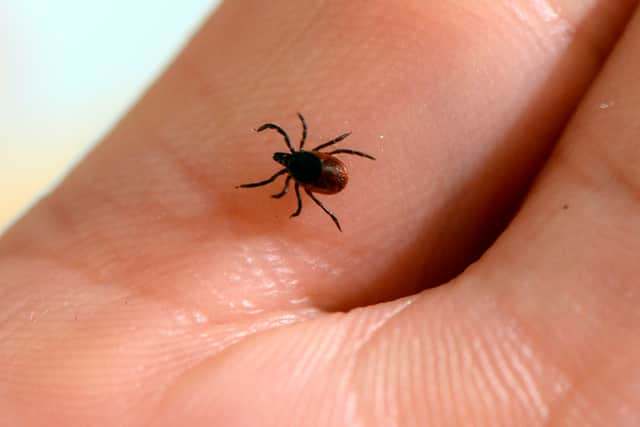TBEV case confirmed in UK: What you need to know about deadly tick-borne virus - symptoms, how to avoid
This article contains affiliate links. We may earn a small commission on items purchased through this article, but that does not affect our editorial judgement.
and live on Freeview channel 276
The first human case of a potentially deadly infection borne by ticks in the UK has been confirmed. Doctors say the first domestically-acquired case of tick-borne encephalitis virus (TBEV) has been identified in a man bitten by ticks in the Yorkshire area.
And another probable human case has also been detected in the Loch Earn area of Scotland. Both cases are described in new research due to be presented at the European Congress of Clinical Microbiology and Infectious Diseases (ECCMID) in Denmark later this month.
Advertisement
Hide AdAdvertisement
Hide AdThe study by Dr Helen Callaby, of the UK Health Security Agency (UKHSA) Rare and Imported Pathogens Laboratory at Porton Down and colleagues, confirms that TBEV is now present in the UK. The diagnosis was first considered by the doctors looking after the patients and confirmed by testing at the UKHSA laboratory.
Dr Callaby said: “This study confirms the tick-borne encephalitis virus is present in parts of the UK where there are relevant tick and wildlife populations and may occasionally cause disease in humans.
“Physicians should consider the possibility of tick-borne encephalitis virus when patients present with unexplained encephalitis and a history of tick exposure - even if they have not travelled outside the UK, as the clinicians did in these cases.”
She explained that TBEV is a flavivirus spread by ticks and, more rarely, consumption of unpasteurised milk from infected animals. TBEV is usually found in western and northern Europe as well as northern and eastern Asia.
Advertisement
Hide AdAdvertisement
Hide AdTicks are becoming more common in parts of the UK, mainly due to increasing numbers of deer. They live in undergrowth and latch on to humans when they walk through long grass.
Dr Callaby said TBEV causes a range of diseases from completely asymptomatic infection to mild flu-like illness, to severe infection in the central nervous system such as meningitis or encephalitis.


What are the symptoms of TBEV?
Dr Callaby said symptoms are similar to other causes of meningitis, and can include a high fever with headache, neck stiffness, confusion or reduced consciousness. TBEV is diagnosed by polymerase chain reaction (PCR) and using serology.
The Rare and Imported Pathogens Laboratory (RIPL) is the only diagnostic laboratory in the UK to perform such testing. Before 2019, human TBEV had not been domestically acquired in the UK.
Advertisement
Hide AdAdvertisement
Hide AdIn 2019 and 2020, two probable cases were reported. But in those cases there was no molecular isolation of the virus so they could not be confirmed.
The European subtype is associated with milder disease, with 20 per cent to 30 per cent of patients experiencing clinical disease. It is assumed that the UK cases are the European subtype, but this has not been proven to date.
Is there a cure for TBEV?
TBEV cases are on the rise in Europe with some 3,800 reported in 2020. Vaccines can provide protection, but only for a limited time, and there is no cure.
It is thought infected ticks may have arrived in the UK via migratory birds. After alternative tick-borne complex diseases were ruled out by PCR testing, one of the confirmed TBEV cases was, based on travel and exposure history, considered to be UK-acquired.
Advertisement
Hide AdAdvertisement
Hide AdDr Callaby added: “Although the risk to the general public is very low, it is important for people to take precautions to protect themselves from tick bites, such as covering their ankles and legs, applying insect repellent and checking clothes and your body for ticks, particularly when visiting areas with long grass such as woods, moorlands and parks."
